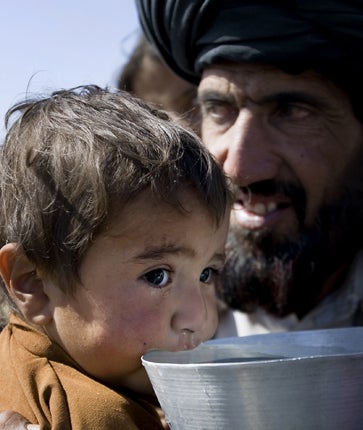Pakistan army 'punishes civilians'
Amnesty International accuses troops of harassing families fleeing fighting

Civilians trying to flee the conflict zone in South Waziristan may be suffering collective punishment at the hands of the Pakistan army, and some have been banned from major roads, a human rights group has claimed.
Amnesty International said civilian members of the Mehsud tribe, trying to leave the region in rag-tag convoys often travelling on the backs of donkeys, were being unfairly harassed by troops suspicious that militants may be hiding among the refugees.
"Mehsud tribespeople, including women and children, are being punished on the roads as they flee simply because they belong to the wrong tribe," said Sam Zarifi, Amnesty's Asia-Pacific director. "This could amount to collective punishment, which is absolutely prohibited under international law."
In Pakistan, the wave of violence that prefaced the army's invasion of the Taliban stronghold continued, more than a week after the troops moved in. A suicide bomber killed eight people at a major air force complex yesterday and many more were wounded in an attack outside a restaurant in the city of Peshawar. In a third incident, up to 17 people travelling to a wedding were killed when their bus struck a landmine.
In the ninth attack on major government targets in the past three weeks, a lone bomber on a bicycle detonated a device at a checkpoint on a road leading to the air base at Kamra, 30 miles from Islamabad. The dead included two soldiers, and more than a dozen people were wounded. Fakhar Sultan Raja, the local police chief told the Associated Press: "The attacker wanted to go inside. He exploded himself when officials wanted to search his body."
Several hours later, in the north-west city of Peshawar, a suicide bomber attacked a complex that includes a restaurant and wedding halls. No one was killed but at least a dozen people were injured, some seriously. Hours later, a bus in the Mohmand tribal region was torn apart, apparently after it drove over a landmine. At least four women and three children were among the 17 people killed, said an official.
Pakistani troops continue to push into South Waziristan in pursuit of Taliban and al-Qa'ida fighters. Militants had warned that they would respond to any operation against them by attacking official targets, but the violence of the past three weeks – attacks included strikes on the army headquarters, UN offices and crowded markets – has unnerved many Pakistanis. This, presumably, is what the militants wish.
What is striking about the slew of attacks is the breadth of targets being struck. The base at Kamra had been identified as a complex where planes designed to carry nuclear warheads are kept, although the military has strongly denied that the base has any such function.
The army's operation in South Waziristan is targeting an estimated 10,000 Taliban previously loyal to the slain militant commander Baitullah Mehsud, along with about 1,000 al- Qa'ida fighters, mainly from Central Asia. The military has imposed a news blackout in the area and prevented journalists from reaching the front line.
But first-hand reports from Amnesty suggest there is considerable harassment of civilians as they try to leave South Waziristan. One member of the Mehsud tribe who spoke to an Amnesty representative outside the town of Tank said he was travelling as part of a group of five families who were trying to leave the area on donkeys but were unable to reach the homes of relatives because of fear of the army.
"We are not allowed to use the roads; the army does not allow any Mehsud to come to the road and use it," he said. "When we left our homes we took some food which we used the first two days and after that we had nothing at all and whatever was left we gave to the children. We drank only tea and water."
Subscribe to Independent Premium to bookmark this article
Want to bookmark your favourite articles and stories to read or reference later? Start your Independent Premium subscription today.

Join our commenting forum
Join thought-provoking conversations, follow other Independent readers and see their replies